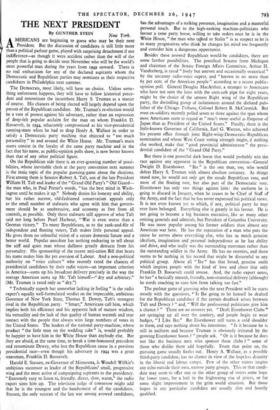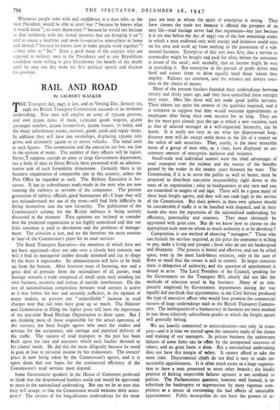THE NEXT PRESIDENT
AMERICANS are beginning to guess who may be their next President. But the discussion of candidates is still little more than a political parlour game, played with surprising detachment if not indifference--as though it were accident rather than the will of the people that is going to decide next November who will be the world's most powerful man during the years from 1949 onward. There is no real enthusiasm for any of the declared aspirants whom the Democratic and Republican parties may nominate as their respective candidates in Philadelphia next summer.
The Democrats, most likely, will have no choice. Unless some- thing unforeseen happens, they will have to follow historical prece- dent and renominate the incumbent Harry S. Truman as a matter of course. His chances of being elected will largely depend upon the person of the Republican candidate. Mr. Truman's re-election would be a vote of protest against his adversary, rather than an expression of deep-felt popular acclaim for the man on whom Franklin D. Roosevelt, in 5944, reluctantly compromised as his vice-presidential running-mate when he had to drop Henfy A. Wallace in order to satisfy a Democratic party machine that objected to "too much personality" in and around the White House. Mr. Truman's main assets consist in the loyalty of the same party machine and in the fact that his name, as public-opinion polls show, is now better known than that of any other political figure.
On the Republican side there is an ever-growing number of possi- bilities, whose inevitable clash at the party convention next summer is the main topic of the popular guessing-game about the elections. First among them is Senator Robert A. Taft, son of the late President William H. Taft and leader of the "Grand Old Party's" Old Guard— the ran who, in Paul Porter's words, "has the best mind in Wash- ington until he makes it up." Nobody denies his honesty and ability, but his rather narrow, old-fashioned conservatism appeals only to the small number of stalwarts who agree with him that govern- ment should be as unobtrusive, and economy as free from all controls, as possible. Only those stalwarts still approve of what Taft said not long before Pearl Harbour, "War is even worse than a German victory." To many Republicans, as to the rank-and-file of independent and floating voters, Taft makes little personal appeal. He gives them no Colourful vision of a secure domestic future and a better world. Popular anecdote has nothing endearing to tell about the stiff and quiet man whose dullness greatly detracts from his personality. His sponsorship of the recent anti-union Bill that bears his name makes him the pet aversion of Labour. And a non-political authority on "voice culture" who recently rated the chances of presidential candidates by their radio voices—an important criterion in America—sums up his broadcast delivery precisely in the way the average American sums up Mr. Taft himself—" dry and arbitrary." (Mr. Truman is rated only as "dry.") "Technically superb but somewhat lacking in feeling" is the radio expert's equally well-formulated verdict on the impeccable, ambitious Governor of New York State, Thomas E. Dewey, Taft's strongest rival in the Republican party. "Smart," Americans call him, which implies both his efficiency and his apparent lack of mature wisdom, his versatility and the lack of that quality of human warmth and true contact with the people that always wins large numbers of votes in the United States. The leaders of the national party-machine, whose product "the little man on the wedding cake" is, would probably be happier to have him in the White House than anybody else. But they are afraid, at the same time, to break a time-honoured precedent and renominate Dewey, who lost the Republican cause in a previous presidential race—even though his adversary in 1944 was a great statesman, Franklin D. Roosevelt.
Harold E. Stassen, ex-Governor of Minnesota, is Wendell Willkie's ambitious successor as leader of the Republicans' small, progressive wing and the most active of campaigning aspirants to the presidency. "Extremely easy to listen to, friendly, direct, slow, warm," the radio expert sizes him .up. The television judge of tomorrow might add that he is the youngest and the handsomest of all the candidates. Stassen, the only veteran of the last war among avowed candidates,
has the advantages of a striking presence, imagination and a masterful personal touch. But to the high-ranking machine-politicians who favour a tame party horse, willing to take orders once he is in the White House, "the man who tasked to Stalin" is as suspect as he'is to many progressives who think he changes his mind too frequently and consider him a dangerous opportunist.
Besides these avowed Republican would-be candidates, there are some further possibilities. The pontifical Senator from Michigan and chairman of the Senate Foreign Affairs Committee, Arthur H. Vandenberg, is rated "lively but uneven and occasionally oratorical" by the uncanny radio-voice expert, and "known to no more than 65 per cent, of the American people" according to a recent public- opinion poll. General Douglas MacArthur, a stranger to Americans who have not seen the hero with the corn-cob pipe for eight years, might be the choice of the utmost Right wing of the Republican party, the dwindling group of isolationists around the diehard pub- lisher of the Chicago Tribune, Colonel Robert R. McCormick. But even ex-soldiers recently polled seven to three against the man whom most Americans seem to regard as "much more useful as Emperor of Japan than as President of the United States." Finally, there is the little-known Governor of California, Earl G. Warren, who achieved his present office through joint Right-wing-Democratic-Republican nomination and whose West Coast voting strength might, if nothing else worked, make that "good provincial administrator" the presi- dential candidate of the "Grand Old Party."
But there is one powerful dark horse that would probably win the race against any opponent in the Republican convention—General Dwight D. Eisenhower. " Ike " is the one man, too, who would defeat Harry S. Truman with almost absolute certainty. As things stand now, he would not only get the steady Republican vote, and most of the floating vote, but also part of the Democratic vote. Eisenhower has only two things against him : the uniform he is going to discard in January, when he ceases to be Chief of Staff of the Army, and the fact that he has never expressed his political views. It is not even known yet to which, if any, political party he may ever have belonged. Everything else is greatly in his favour. He is not going to become a big business executive, like so many other retiring generals and admirals, but President of Columbia University. He was more popular among his former soldiers than almost any American war hero. He has the reputation of a man who puts the cause he serves above everything else, who has as much genuine idealism, imagination and personal independence as he has ability and drive, and who really was the outstanding statesman rather than the outstanding soldier in the Army. He has no enemies, and there seems to be nothing in his record that might be distasteful to any political group. Above all " Ike " has that broad, genuine smile which inspires people with the kind of love and cheer that only Franklin D. Roosevelt could arouse. And, the radio expert notes, he has " a basically smooth, friendly, non-oratorical delivery (although) he needs coaching to cure him from talking too fast."
The parlour game of guessing who the next President will be starts mostly with the questions, "Is Ike going to let himself be drafted for the Republican candidacy if the certain deadlock arises between Taft and Dewey? " and, "Will the professional politicians give him a chance ? " There are no answers yet. "Draft Eisenhower Clubs" are springing up all over the country, and people begin to wear badges, "I Like Ike." But Eisenhower still turns a cold shoulder to them, and says nothing about his intentions. "Is it because he is still in uniform and because Truman is obviously irritated by the growing Eisenhower boom ? "people ask. "Or is it because he does not like the business men who sponsor those clubs ? " some of those who dislike them add hopefully. From that point on, the guessing game usually fizzles out. Henry A. Wallace, as a possible third-party candidate, has no chance in view of the hopeless disunity in the liberal and labour camps. Few of the other names inspire any echo outside their own, narrow party groups. This or that candi- date may seem to offer one or the other group of voters some hope for lower taxes, for a halt in the frightening rise of prices, or for some slight improvement in the grim world situation. But those hopes in any particular candidate are usually slim and heavily qualified. Whenever people refer with real confidence to a man who, as th next President, would be able to avert war (" because he knows wha it would mean "), to avert depression (" because he would not hesitat to deal ruthlessly with the vested interests that are bringing it on" and to create a healthier and more Co-operative atmosphere at horn and abroad (" because he knows how to make people work together" —they refer to "Ike." Even a good many of the sceptics who ar opposed to military men in the Presidency and to any Republican candidate seem willing to give Eisenhower the benefit of the doub until he may one day make his first political speech and disclose his position.































 Previous page
Previous page